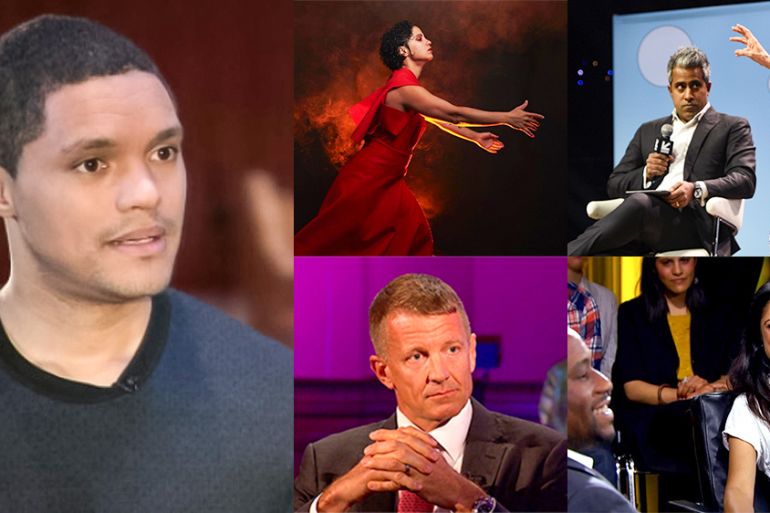Five debates and discussions to watch during lockdown
From the power of comedy and music to the ultrarich and the business of war – five conversations beyond coronavirus.

We all enjoy a good discussion. But with more than a third of the world under lockdown as governments do all they can to curb the spread of COVID-19, the opportunity for lively in-person debate is now rare. Luckily, Al Jazeera has an archive of discussion shows to tap into and watch.
Here is a list of five of our favourite conversations from recent years:
Keep reading
list of 4 itemsJournalist loses foot after being badly wounded in Israeli attack in Gaza
The Take: Layoffs are decimating the media industry. Who profits?
Media feel pressure to tell ‘positive’ China story as party tightens grip
1) On pop culture and the workings of injustice and oppression
Writers Fatima Bhutto and Marc Lamont Hill
“I get asked all the time: ‘why are you writing when you could be doing?’ And I think writing, for me, is a form of doing. I think exactly because imperialism is oppressing and silencing so many people, that is a valid form of fighting back: to write, to have different stories. And I think it means something for those of us who come from the global south, for those of us who are Asian or Muslim to see our stories reflected in fiction, in film – and not only in the news.” – Fatima Bhutto
Watch the best-selling author and niece of former Pakistani Prime Minister Benazir Bhutto in conversation with American academic and writer Marc Lamont Hill. They compare notes on writing as resistance, the power of a dangerous idea, and the various ways injustice and oppression work across the world.
|
|
2) On private militaries and the business of war
Blackwater founder Erik Prince
“Mehdi Hasan: What drives you? When you kind of come up with these plans to do private security, especially in a lot of these Muslim-majority countries. Because you yourself have referred to the people your men were fighting in Iraq as … ‘the chanting barbarians American troops had been sent to liberate’?
Erik Prince: People that think it’s OK to drive a car bomb into the middle of a square, into the middle of a market place, to attempt to kill an American and in doing so they kill dozens and dozens of civilians, absolutely that’s barbaric.
Mehdi Hasan: Which is true; I think if you’re referring to terrorists, you call them whatever you want. But you said, ‘these were the chanting barbarians American troops had been sent to liberate’. You weren’t sent to liberate terrorists? It sounds like you’re talking about Iraqis.”
Watch as Head to Head host Mehdi Hasan challenges Erik Prince, the founder and former CEO of private security firm Blackwater, on war crimes in Iraq, plans for a private army in Afghanistan, and Donald Trump.
|
|
3) On politics, laughter and the truth
Comedian Trevor Noah
“Being in a space where a president, or any political leader, can pursue news organisations on a whim is a scary, scary place to be in because I come from a country where censorship was a normal part of our lives … [But] the closer you get to censorship the more comedy thrives. That’s what I’ve always found. Freedom of speech is something that people pursue regardless of the laws. As human beings we want to speak our minds, whether it’s whispered in back alleys or whether it’s proclaimed from a pulpit. As human beings we want to tell the truth about what we see. And so comedy is essentially supposed to be that.”
Born in apartheid South Africa to parents of different races, comedian Trevor Noah’s existence was considered a crime by his own government. Now in the US as host of the Daily Show, he talks about segregation and oppression in the two countries, and whether political satire can be a force for change. Watch his interview from 2017.
|
|
4) On the question of billionaires
Author Anand Giridharadas and economist Arthur Laffer
“You start to see people who run a company like Amazon, own a company like Amazon, become the richest person in the world, while workers at Amazon are peeing in a bottle because the company doesn’t give them enough break time in the relentless drive for productivity. The people down below are not down below because they happen to be down below, they’re down below because someone is actually standing on their back.” – Anand Giridharadas
As the US faces growing criticism that it is moving from a democracy to a plutocracy, watch as author Anand Giridharadas and Arthur Laffer, an economist and former adviser to President Trump, debate inequality and how to close the gap between the rich and the rest.
|
|
5) On music and revolution
Singer-songwriter Emel Mathlouthi
“Besides [only] the political side of it, I really want to fight against any kind of dictatorship: the social dictatorship, the traditions, the way that I am supposed to behave as a young Arab woman. So I really try to fight against all of this – not have rules, push all the boundaries and really not have any limit but the sky.”
Tunisian musician Emel Mathlouthi’s song ‘Kelmti Horra’ (My word is free) became an anthem of the Arab Spring after she sang it in the streets during Tunisia’s Jasmine Revolution in 2011. Years later, her words still express the hopes of people looking for major political change in the Arab world. Watch as she talks to The Stream about the persuasive power of music.